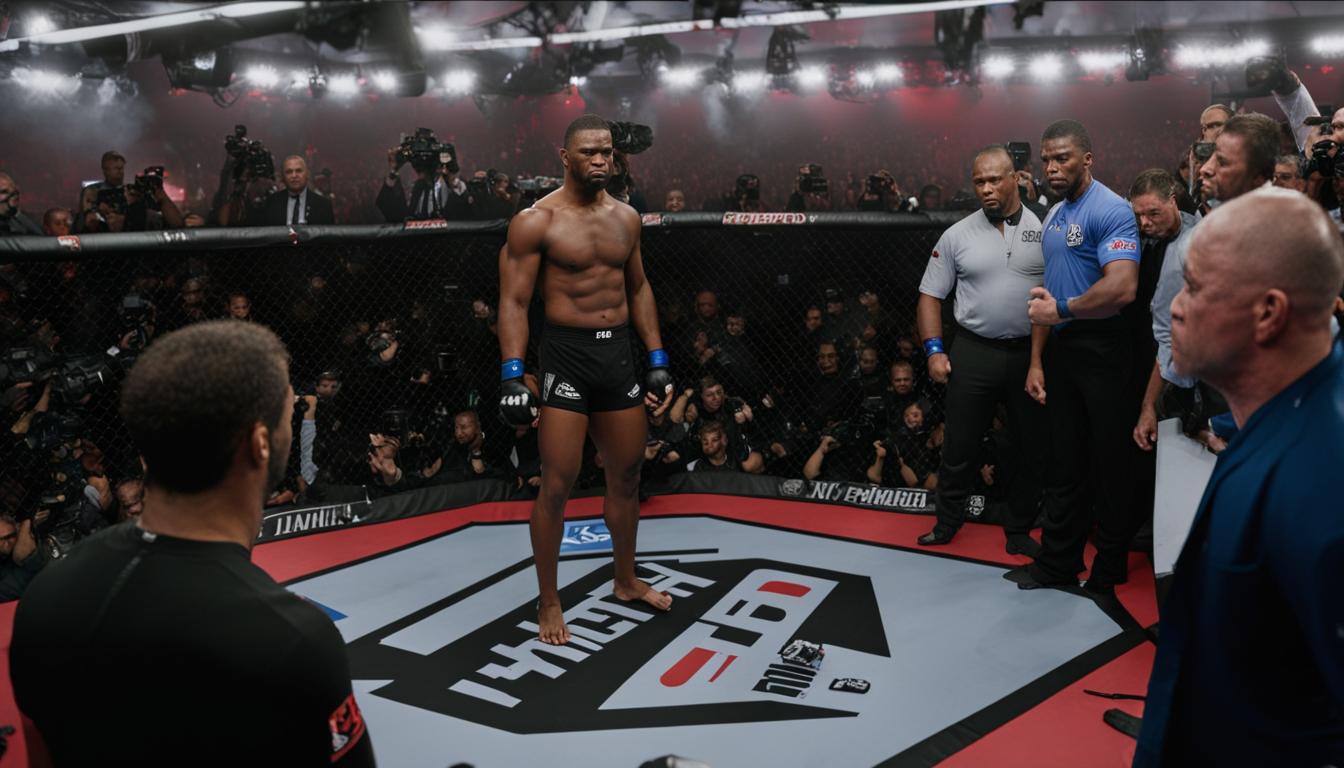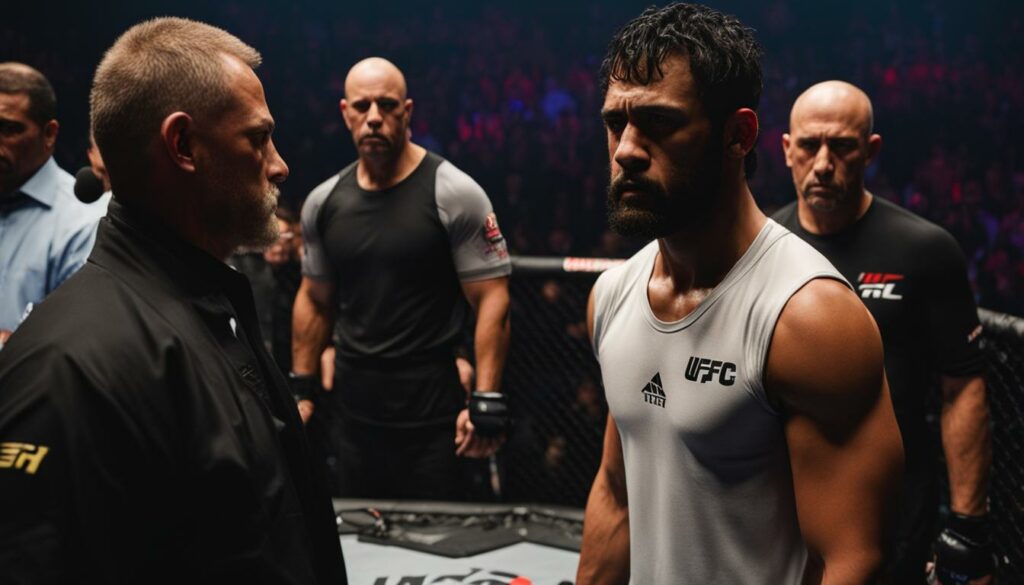In the world of combat sports, weight plays a crucial role. It determines the weight class in which a fighter competes and affects various aspects, including betting odds. Making weight refers to the process of reaching the agreed weight for a fight. However, sometimes fighters fail to meet the weight limit, resulting in a weight miss. The UFC has specific weight classes for different divisions, with allowances for title and non-title bouts. The weight cutting process is strictly regulated to ensure fairness in competition. When a fighter misses weight, there are consequences, including potential changes in the fight arrangements and financial penalties.
Key Takeaways:
- Missing weight in the UFC can have serious implications for fighters.
- Weight cutting in the UFC is closely monitored and regulated.
- Fighters who miss weight may face changes in their fight arrangements and financial penalties.
- Repetitive weight misses can affect a fighter’s career and opportunities.
- Opponents have the option to accept a catchweight if their opponent misses weight, but it is not always preferred.
What Does It Mean to Miss Weight in the UFC?
Missing weight in the UFC refers to a fighter weighing in more than the contractual weight limit for their specified weight class. The UFC has different weight classes for male and female fighters, ranging from heavyweight to strawweight. In title bouts, there is less flexibility, with a maximum allowance of 0.5 pounds over the weight limit, while non-title bouts allow a leeway of one pound.
Although a pound or two may not seem significant, it can provide a considerable advantage to the fighter who misses weight. Hence, weight cutting is closely monitored and regulated.
Weight cutting involves drastic methods to shed pounds to reach the desired weight class. However, the process can be dangerous and result in severe health risks. Due to such risks, the UFC has imposed regulations to ensure fighters maintain their weight safely and avoid potential harm.
When a fighter fails to make weight, it not only affects their own performance and reputation but also impacts the fairness and integrity of the sport. The consequences of weight miss in the UFC are substantial, ranging from financial penalties to changes in fight arrangements.
Furthermore, the opponent’s willingness to accept a fight at a catchweight becomes pivotal. In some cases, fighters might refuse to compete against an opponent who missed weight, which can lead to fight cancellations or last-minute replacements. Each weight miss has its unique repercussions, and the severity of consequences depends on various factors.
| Consequences of Missing Weight |
|---|
| Financial penalties |
| Changes in fight arrangements |
| Potential fight cancellations |
| Opponent’s refusal to compete at catchweight |
| Reputation damage to the fighter who misses weight |
Repercussions of Missing Weight in the UFC
When a UFC fighter misses weight during the morning weigh-in, the state athletic commission may grant them an additional hour to make the weight. If they fail to do so, the UFC typically offers their opponent the option to accept a fight at a catchweight, which is a negotiated weight limit.
The fighter who misses weight is usually asked to forfeit a percentage of their purse, usually between 20% to 30%. Additionally, they may be ineligible for post-fight bonuses. In the case of a UFC title fight, the fighter who misses weight is forced to vacate the belt, and only the opponent can win the title.
Weight cutting in the UFC comes with its dangers and risks. Extreme dehydration and drastic weight loss methods may lead to severe health complications. The UFC’s strict weight class regulations exist to prevent such violations and ensure the safety of the fighters.
It is important for fighters to adhere to the weight limits and recognize the potential consequences of missing weight. Not only does it impact their chance of victory, but it also affects their reputation and future opportunities within the organization.
Impact on the Fighter’s Career
When it comes to weight issues in mixed martial arts, missing weight can have significant consequences for a fighter’s career. Not only does it reflect poorly on their professionalism and discipline, but it can also lead to negative implications for their future opportunities and success.
Repetitive weight misses may result in the UFC asking the fighter to move up a weight class. While this may seem like a simple solution, it can have far-reaching effects on their performance and chances of competing for a title. Moving up to a higher weight class often means facing opponents who are naturally bigger and stronger, presenting a whole new set of challenges for the fighter.
In addition to the impact on performance, weight cutting itself can take a toll on a fighter’s health. Dehydration and the depletion of energy levels are common issues associated with extreme weight cuts. These physical consequences can have long-term implications, affecting a fighter’s overall well-being and longevity in the sport.
Weight management is a crucial aspect of mixed martial arts, and fighters who can effectively manage their weight have a distinct advantage. It not only ensures that they remain within their designated weight class, but it also allows them to perform at their optimal level, both physically and mentally.
The Importance of Proper Weight Management
Proper weight management involves a combination of healthy nutrition, structured training, and careful planning. By working closely with nutritionists and strength coaches, fighters can create a sustainable and balanced approach to their weight goals.
Implementing strategies such as gradual weight loss, smart hydration techniques, and regular monitoring can help fighters maintain their weight more effectively, reducing the need for extreme weight cuts. This not only minimizes the potential risks to their health but also increases their chances of consistently making weight for their fights.
Overall, weight issues in mixed martial arts are a significant concern, both for individual fighters and the sport as a whole. By prioritizing proper weight management, fighters can improve their career prospects, protect their health, and ensure fairness in competition.
What Happens if the Opponent Refuses the Catchweight?
While it is rare, there have been instances where an opponent refuses to face a fighter who missed weight. In such cases, the UFC has two options: cancel the fight or find a new opponent on short notice. Finding a replacement fighter within a day, who can also make weight, is a challenging task. The UFC may have a backup weigh-in for title fights, ensuring that they can quickly substitute a fighter if necessary. Failure to find a suitable replacement could result in the cancellation of the bout.
| Impact on the Fighter’s Career | Consequences |
|---|---|
| Potential career setbacks | Financial penalties |
| Deterioration of professional reputation | Changes in fight arrangements |
| Mandatory weight class changes | Potential loss of title opportunities |
Quotes:
“When a fighter misses weight, it creates a ripple effect throughout the event. The opponent may feel that it’s unfair to face someone who didn’t meet the contractual weight limit. It puts both fighters at a disadvantage and disrupts the entire fight card.” – Arnold Martinez, UFC commentator
- Option 1: Cancel the fight
- Option 2: Find a replacement fighter on short notice
Conclusion
Missing weight in the UFC can have significant consequences for fighters. Not only do they face financial penalties and potential changes in fight arrangements, but their entire career can also be impacted. The strict regulations and weight cutting process in the UFC are in place to ensure fairness in competition and protect fighter safety.
Fighters must prioritize effective weight management and meet the agreed-upon weight limit to avoid the repercussions of missing weight. It reflects poorly on their professionalism and discipline when they fail to make weight, potentially affecting their opportunities for title shots and overall success in the sport. Furthermore, the physical toll of weight cutting can have long-term implications for their health.
It is crucial for UFC fighters to approach weight management with care and proper guidance. By doing so, they can avoid the pitfalls of missing weight and maintain a competitive edge while safeguarding their career prospects.



